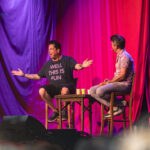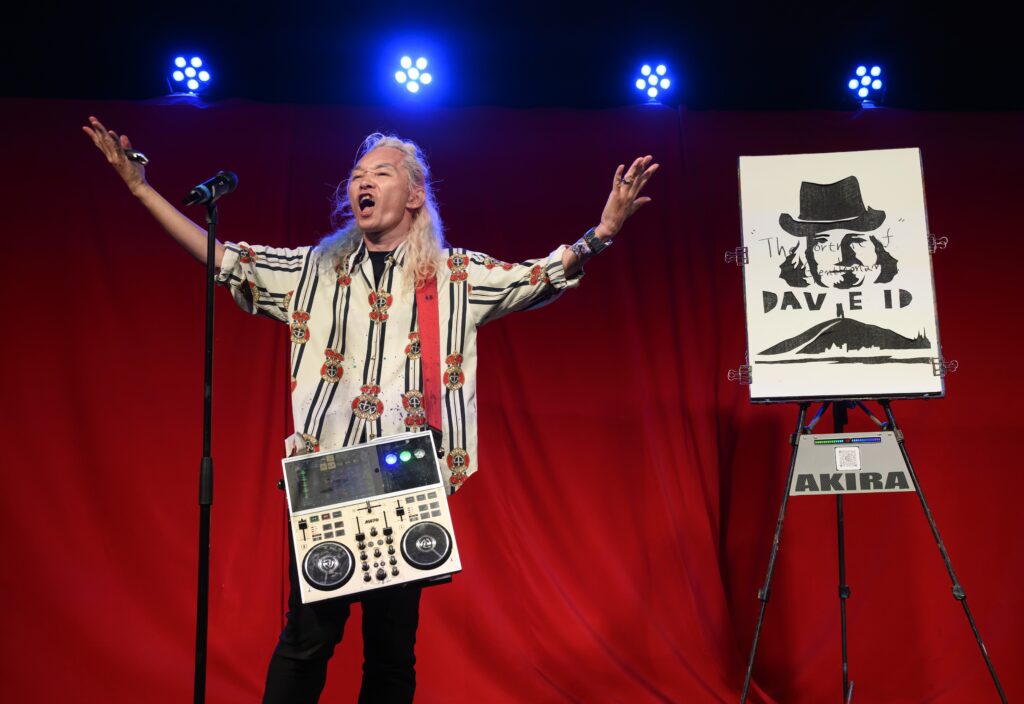The programme for the Almeida Theatre’s current production of Macbeth features W.B. Yeat’s poem The Second Coming which includes the famous line, ‘turning and turning in the widening gyre.’ It seems more appropriate here at the Donmar Warehouse and their production of Cordelia Lynn’s new play Love and Other Acts of Violence, where history is doomed to repeat itself – the gyre is forever turning.
The production, directed by Elayce Ismail, is billed as “a subversive and intimate love story about inheritance and the cycles of politics and history” – the ‘inheritance’ being the inherited psychological trauma being passed through generations. The theme is clear by Lynn in the actions of Her (Abigail Weinstock) and more subtly in the actions of Him (Tom Mothersdale). She reveals she has changed her name, in case she should ever need to run. He is impassioned and short-tempered, prone to outbursts and literal violence.
 |
| Tom Mothersdale and Abigail Weinstock. Photo: Helen Murray |
The play opens as the pair meet for the first time at a party in Her’s flat – he is a politically active student with writing aspirations, she works in the university’s lab. It is the best section of the play, Mothersdale flawlessly playing a party guest who is oblivious to his space-invading, as he mansplains capitalism to the visibly uncomfortable Her. He is every other male feminist who doesn’t understand women. His performance gives the impression that if he wasn’t at the party he would be angrily tweeting minor celebrities for minor discretions.
From here Lynn maps their relationship, and the parallel rise of Nationalism within their society, highlighting their supposedly inherited trauma. While Her’s Jewish heritage and stories about her family history make it clear where her trauma comes from, the suggestion of where his trauma comes from, hinted at during the play, is not revealed until the ‘epilogue’ when Basia Bińkowska’s simple staging of the main section is transformed, the ceiling descending to reveal a hidden room in Lemberg in 1918 where Tatte (Richard Katz) is sanding a wooden toy Ram as the Polish Army approach.
It is Mothersdale who keeps the play interesting; when she reveals that she hadn’t meant to ask him to move in with her, that she actually wanted a break, he doesn’t need to move a muscle as his face conveys the dawning realisation that things aren’t as they seem within their relationship. Weinstock does well in her first professional stage appearance, though her performance lacks depth at points in their relationship, such as when he suggests children. However, her performance grows across the play’s 100 minutes, and is strongest during her final scenes as Baba.
 |
| Richard Katz. Photo: Helen Murray |
Weinstock is somewhat hampered by the text, some of her main scenes playing out in almost Beckettian style – short, sharp sentences and dialogue that ends up sounding unemotional and one dimensional because of it. It is also not clear from the text what is keeping the couple together, unless it is simply their historical connections. ‘We work,’ one says to the other during a scene where they are clearly not working, and the audience not shown any real suggestion of them ever having worked – besides a fling on a kitchen counter.
That said, the epilogue is finely written, and finely acted – Katz is particularly good as the composed Tatte – and the visceral destruction caused by the arrival of the Polish forces is both shockingly and stunningly recreated through Bińkowska’s design, lighting by Joshua Pharo and sound by Richard Hammarton.
However, it is not clear what value the epilogue really adds to a play, other than to show where Him inherited his own trauma from. The hints throughout the main section of the play had been enough to suggest where it may have come from; her reaction to learning the share the same ancestral home, his destruction of one of her prized belongings. Taking away any doubt about his role in their shared family history detracts from the play in that it assumes that no audience member would have been able to join the dots and create a picture of his ancestry.
There is, however, one touching moment in the epilogue when, just for a moment, it appears that their ancestors are their present day selves.
Love and Other Acts of Violence is at the Donmar Warehouse until 27 November.















